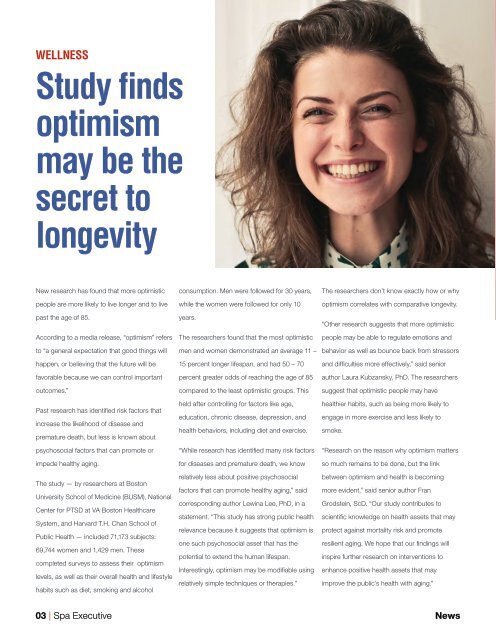Create successful ePaper yourself
Turn your PDF publications into a flip-book with our unique Google optimized e-Paper software.
WELLNESS<br />
Study finds<br />
optimism<br />
may be the<br />
secret to<br />
longevity<br />
New research has found that more optimistic<br />
people are more likely to live longer and to live<br />
past the age of 85.<br />
According to a media release, “optimism” refers<br />
to “a general expectation that good things will<br />
happen, or believing that the future will be<br />
favorable because we can control important<br />
outcomes.”<br />
Past research has identified risk factors that<br />
increase the likelihood of disease and<br />
premature death, but less is known about<br />
psychosocial factors that can promote or<br />
impede healthy aging.<br />
The study — by researchers at Boston<br />
University School of Medicine (BUSM), National<br />
Center for PTSD at VA Boston Healthcare<br />
System, and Harvard T.H. Chan School of<br />
Public Health — included 71,173 subjects:<br />
69,744 women and 1,429 men. These<br />
completed surveys to assess their optimism<br />
levels, as well as their overall health and lifestyle<br />
habits such as diet, smoking and alcohol<br />
consumption. Men were followed for 30 years,<br />
while the women were followed for only 10<br />
years.<br />
The researchers found that the most optimistic<br />
men and women demonstrated an average <strong>11</strong> –<br />
15 percent longer lifespan, and had 50 – 70<br />
percent greater odds of reaching the age of 85<br />
compared to the least optimistic groups. This<br />
held after controlling for factors like age,<br />
education, chronic disease, depression, and<br />
health behaviors, including diet and exercise.<br />
“While research has identified many risk factors<br />
for diseases and premature death, we know<br />
relatively less about positive psychosocial<br />
factors that can promote healthy aging,” said<br />
corresponding author Lewina Lee, PhD, in a<br />
statement. “This study has strong public health<br />
relevance because it suggests that optimism is<br />
one such psychosocial asset that has the<br />
potential to extend the human lifespan.<br />
Interestingly, optimism may be modifiable using<br />
relatively simple techniques or therapies.”<br />
The researchers don’t know exactly how or why<br />
optimism correlates with comparative longevity.<br />
“Other research suggests that more optimistic<br />
people may be able to regulate emotions and<br />
behavior as well as bounce back from stressors<br />
and difficulties more effectively,” said senior<br />
author Laura Kubzansky, PhD. The researchers<br />
suggest that optimistic people may have<br />
healthier habits, such as being more likely to<br />
engage in more exercise and less likely to<br />
smoke.<br />
“Research on the reason why optimism matters<br />
so much remains to be done, but the link<br />
between optimism and health is becoming<br />
more evident,” said senior author Fran<br />
Grodstein, ScD. “Our study contributes to<br />
scientific knowledge on health assets that may<br />
protect against mortality risk and promote<br />
resilient aging. We hope that our findings will<br />
inspire further research on interventions to<br />
enhance positive health assets that may<br />
improve the public’s health with aging.”<br />
03 | <strong>Spa</strong> <strong>Executive</strong> News


















